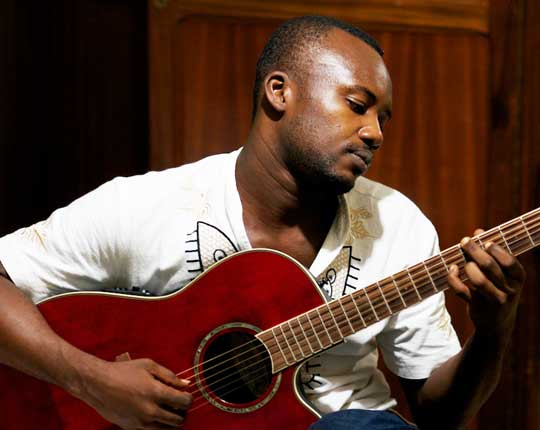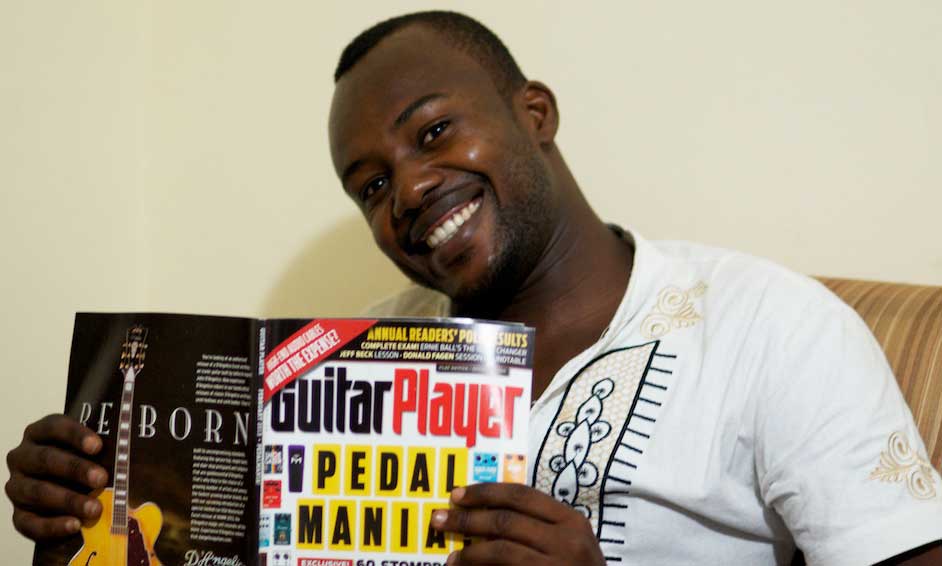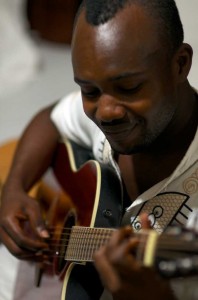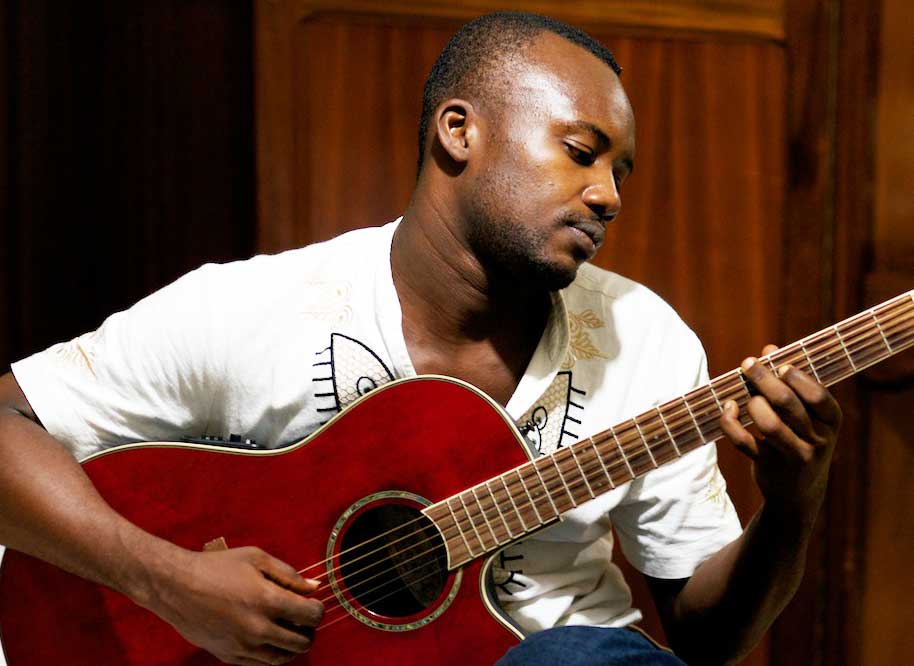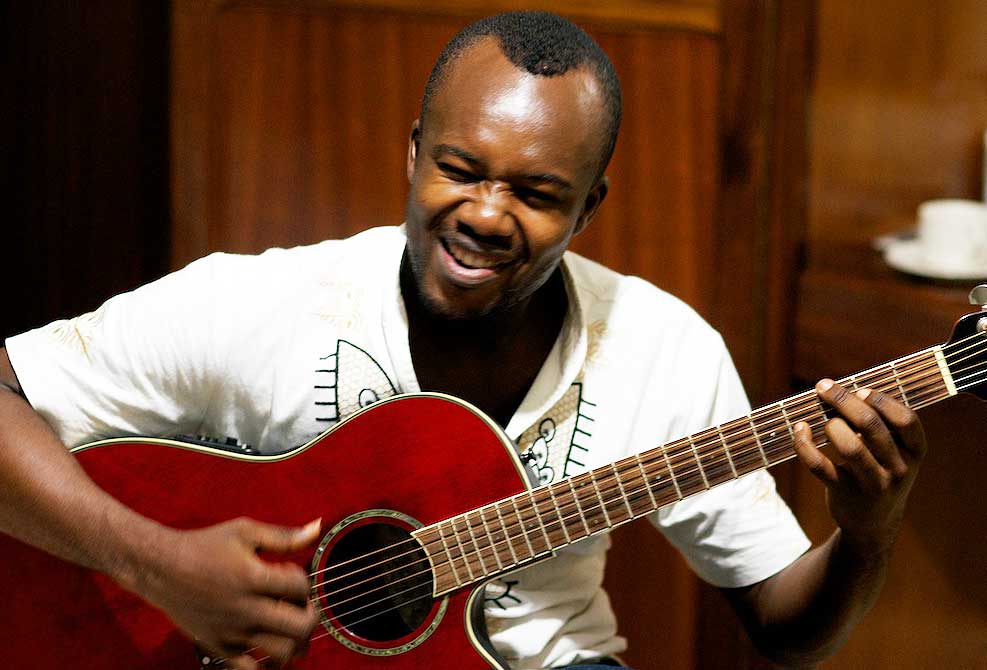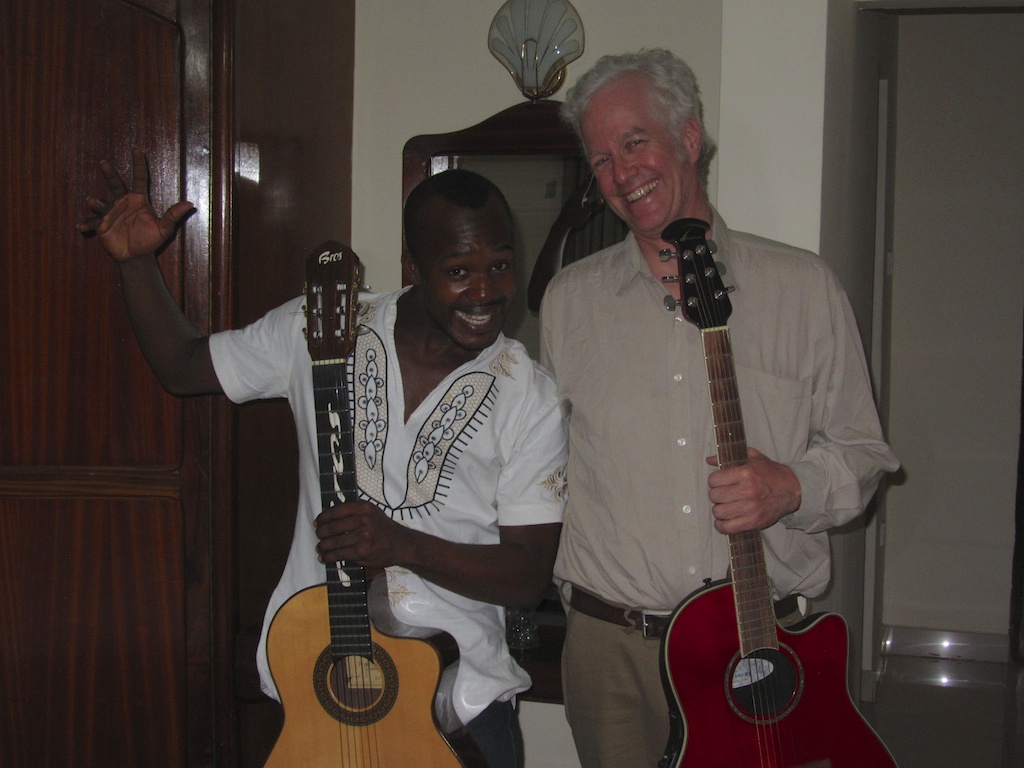Kyekyeku is a rare cat indeed in Ghana—a talented young guitar player interested in learning and developing the all-but-vanished art of palm wine guitar. The Afropop team learned about him when Benjamin Lebrave of Akwaaba Music suggested we meet. The encounter was rich, and the music from that session is featured on Afropop Worldwide’s “Afropop Live: 2013.” Program. Before the session, Banning Eyre and Sean Barlow had a chat with Kyekyeku. Here’s their conversation.
Banning Eyre: Introduce yourself. Tell us a little bit about your youth and how you became a musician and how you got involved with palm wine guitar.
Kyekyeku: My name is Kyekyeku. Young man who wants to walk in the footsteps of the old guys. I started music because my dad was a piano player back in the day and he gave me some lessons, but then I got addicted to the guitar after seeing Koo Nimo play on TV when I was very small. And the next time I met him was 15 years after, but the song he played on TV stuck in my mind, and when I met him, I sang portion of the song that I’d heard. So then he took out his guitar and played for me and that moment I knew that was what I wanted to do-- to play palm wine guitar, palm wine music. But of course because I live in a different era, it’s very difficult to settle on one thing. There’s a lot of things going on. So I’ve been trying my hand at a lot of things like rock and I’ve even gotten techniques from flamenco. But integrally, I know I want to still be known for carrying the tradition of palm wine guitar, palm wine music, and then also cycling it with several more influences that I’ve got throughout these times of my musical life and career.
BE: What was the song that you heard that first time?
K: “Gyamena Boo.” [SINGS] This is one of Koo Nimo’s all time great songs. I saw him on TV playing. I might have been six or seven at this time. I saw him maybe for just 30 seconds. But something clicked in my mind, and for the next 15 years I didn’t hear Koo Nimo’s music or see him until I went to the university where he was teaching. And so one guy saw me and said, “You have a guitar. You should go and see Koo Nimo.” This man was sitting here and nothing had really changed. His white beard was still the same and his voice and everything. I remembered from the TV and I told him my story. I started playing “Gyamena Boo” to him and he pulled his guitar from his side and started playing the song to me. I shed a tear at that moment. I knew that was the right place to be. Since that time, for 6 or 7 years afterwards, he would take me to his home, eat with me, take me on tours with him, teach me a lot of things that I can’t even recount in words.
BE: That’s really interesting. I remember when I met him 20 years ago, he was very concerned about the fact that weren’t very many young guitarists who were interested in this music and taking it seriously. So he must have been very happy to find you.
K: He must have been very happy. Yes. I could even sense that there were not so very many people. There was this general stigmatization with guitar playing—that it was for drunkards and things like that. So this has changed over time—within the last maybe ten years. But he was very happy that young people were coming to him and expressing interest in learning guitar, and even more, in learning his style of music—palm wine and odonson. And so for the first semester that I took his course in the school, during the exam time, I missed the timetable and so I couldn’t turn up for the exam. And he was so mad and said to me, “How can you do this? You are my best student. How can you miss the exam?” So he had to arrange for a new sort of exam to be taken. And that’s how important we were to him. It was not only me—there were about three or four other students who were interested in learning his style, but I guess I was one of those who took it seriously and decided to explore it more. So, each time I speak to him, he lets me know that I mean a lot to him. And he’s ready to let me have what it takes.
BE: That’s beautiful. So you grew up in Accra, no?
K: I grew up in Accra as much as I did in Kumasi.
BE: So you were in between the two?
K: In between the two. But my infancy was infancy was in the eastern region, which is a traditional Akan area. In this area, I heard a lot of Akan music, but there was a strong presence of other tribes, so there was a mix—hearing Krobo music and things like that. This influenced me a lot. When I moved to Accra, it was more cosmopolitan and a lot of influences were coming in. There were sitcoms we were seeing on TV, a lot of things coming from America. For some reason, I think everyone was confused. So at secondary school in Accra, I made the decision to go to Kumasi just because I wanted to improve the Akan side of me more and Kumasi is seen as the cradle of Akan culture. So that was the main reason that I went to secondary school in Kumasi, and then from there I did university there, in which case I met Koo Nimo there. So it all came together for me. I am blessed to have experience in these three areas—Accra, Kumasi and the eastern region. In Accra, it’s very difficult to pursue traditional music in traditional forms, unless you are maybe in a very typical Ghana traditional area. In Kumasi, I can easily carry a prempensua around and walk in the city and everyone is cool with that. People don’t look at you twice.
BE: A prempensua—tell people what that is.
K: A prempensua is a traditional rumba box. It’s a box made of wood with three metal prongs that you hit rhythmically and it serves as the base instrument when we’re playing palm wine or odonson music.
BE: So it would be prempensua, seperewa and guitar?
K: Prempensua, seperewa, guitar, bells—like the banana bell. Then you have a complete palm wine set or odonson set. And, as I said, in Kumasi, you can easily carry this around and everyone knows it’s part of the life, but in Accra, I carry this and people see me as not the cool guy. It’s not cool to carry this around. I mean, everyone wants to carry something else.
BE: You can feel that when you do that?
K: I can feel it. So I love the two places but for different reasons. And Kumasi’s influence on me has been in the sense that it helped me develop my indigenous side a lot. Accra sort of helps me by giving me the avenues to network and these sorts of things.
BE: Let’s stick with Kumasi for a second because I remember being very struck when I met Koo Nimo in 1993—the way he talked about music and history intertwined like that. Everything had to do with things that happened in the past and the history of the Akan people, the Kingdom and this sort of thing. I’m curious to know what your experience with that is, with the music as a way of understanding the past and understanding history. Was that part of the experience for you?
K: Yeah. That was part of the experience. Koo told me a lot about Ashanti history, Akan history orally and sometimes through music. But for us, our generation, it’s difficult—we don’t find on the shelves easily books where you can read about what happened in the past. So through music like that we get an idea of what things felt like in the past. Some of the songs called the names of kings and things like that, so they give you an awareness of what has been. Even though for us there is a conscious effort to dwell on what is in the present and what will be seen in the future. This sort of music has always been a record keeper for us. This is what I gather form people like Koo Nimo and Kwabena Nyama, who are very typical historians in that sense. So it tells a lot about history. It tells a lot about what has happened in the past. Oftentimes I hear the names of Ashanti kings and things like that—names and appellations and what activity or act of valor some king did in the past. Whether that influences our actions now as young people is another thing altogether. I don’t know how many people are listening to this music anymore. There’s a lot of history to be learned from this music.
BE: But for you, personally, it does make a connection.
K: It makes a connection. I don’t really have to worry about where I’m coming from and where I’m going. I have Ghanaian friends who have lived in America or were born there, and when they come home and I speak with them, I get this feeling of a conscious effort to know that you are from here. If I felt this way then the music that tells the history would mean a lot more to me. But unfortunately it doesn’t happen like that. I just get this music and I move on. Of course, if I find myself in a situation where I have to recount what has happened and I get something from the music, it works alright. But it does not really tie me down. It’s nice to know that something has happened and it’s nice to know that history, but I don’t feel that there is really a need for me to dwell on it. If anything at all, I feel the need to move forward and explore. Taking meaning from the symbol of the sankofa bird—that you look at what is good from the past, fulfill the present and then cast a shadow into the future. So for me, this is exactly what it is.
Sean Barlow: One thing that I always noticed about Koo Nimo is that there was always a strong aspect of parables and teaching, how people treated each other or how people were fooling themselves. He was almost like the wise man of the village. And this is everything from this huge Revofest concert that we heard back in the mid 80s. He has a stadium of hundreds of thousands of people and he’s still doing this lesson, as if he was in the focused university setting and everyone was really paying attention. Is that a part of his legacy that you’ve absorbed and take on, that you appreciate?
K: Very much so. When I have performed, very often I have done storytelling, which is something that I picked up from my grandparents when I was young in the Eastern region, but also for the most part from Koo Nimo. And whenever I hear these stories in a traditional setting, it’s supposed to document a certain moral. And I’ve picked these things over the time from Koo Nimo, and also my grandparents, who were great storytellers. When the audience is right and I put in a storytelling performance, it’s to make people aware of the traditional heritage that we have, and also to give people the perspective of knowing what we perceive of as right—our moral understanding. Because what can be perceived as right from our society may not be in another society. Through the storytelling, people can also give their own meanings to these things, but I guess what is desirable can be very universal. So storytelling becomes a very good way to convey these things across.
SB: So you’re very aware of taking from this tradition and moving into the future-- the good things in the future. What about leaving behind the bad things or actually pointing to them and saying, “It’s not alright to take 10 wives,” or whatever? You want to take the good stuff and move it into this complicated technology setting, but what about the stuff that you might not be comfortable with?
K: You take what you know is good and can help society and use it. But it’s very difficult to know what is good without knowing bad. So as much as you trumpet about the good things that should be carried on, you must also trumpet the bad things, and say, “These things are not good, so let’s leave them behind”—be it, traditional practices or ways of life or ways of seeing society and behavior. I have a big problem with what the Ghanaian society has become now, with religion, church, and things like that. And maybe 30, 20 years ago, we didn’t see this, but now, it’s becoming evidently clear that some attitude from a religious point of view is obviously hurting our progress. So for stuff like this, it’s very important to trumpet them and then ask people to leave them behind.
BE: That’s interesting. How would you describe the problem of the role of religion? What’s the problem?
K: For me, it’s breeding apathy and laziness and finding a certain image to throw responsibility on. There’s a certain image of God—a religious God that we have created. And for things that we can do as humans—because of laziness, finding reasons to be lazy—we put all these things on God. We say, “This guy is going to do that.” When it rains my room gets flooded just because I’ve thrown the pulley bag into the gutter and the gutter gets choked, so the rainwater does not go as it should be. And so my room gets flooded. I don’t hope that God helps me. It is a very practical thing to do. But I think that in this sense churches say, “Wait on God. Wait on God. Wait on God. God will do it.” Instead of taking pragmatic steps. I think a year or two ago, Ghana was rated as the most religious country in the world. You go to church Monday through Friday from 12 noon, which is the heart of working hours, and you find people in the church, praying. So I’m not sure that God is going to say, “OK. You prayed to me for more hours than anyone else did, so I’m going to reward you.” I don’t think it works that way. So people are finding excuses to be lazy. And they are putting all these things on poor God. It’s not helping us. And a few of us are becoming vocal about these things, especially I’ve seen a lot of posts from Kubolor and things like that. Wanlov the Kubolor. For me, he’s one of the persons that’s breaking down boundaries with the ways of thinking and as contemporaries, one of the people who inspires me a lot. I think, with a voice like that, it helps us comment on those things that have to be left behind and things that have to be carried and move forward with.
SB: How old are you, by the way?
K: I’m 29 this year. In February 3rd, I’ll be 29. And that’s not my football age. That’s my real age. [LAUGHS] Sometimes I feel I am getting old, but living with Koo Nimo—it lets me know who an old person is. I am not old. I’m just 29 years. It’s just that I feel I should have been somewhere else at 29, but life is still a process, so I’m not pissed off.
BE: Do you have a group? Have you made recordings? Talk about that side of things.
K: I have been more of a performing artist for most part of my music life, even though
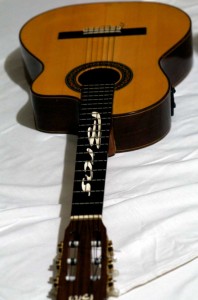
recently I have released a couple of singles. But what I have done in the past is to create projects and work with them. Sometimes it has been a traditional duo. Sometimes it has been maybe a quartet. Last year I was on a project called Faint Medal, which is Afro-rock music and we released one or two singles. On the underground scene of Accra we made a lot of waves. Two years back, I performed in UK with a friend from Burkina Faso who plays ngoni. So it was ngoni and guitar trio—palm wine Ghanaian guitar style mixed with Burkina ngoni stuff, which was sort of like a West African Rodrigo y Gabriela. And we had very good reviews and reception at Latitude Festival and the Big Chill Festival in the UK. So I’ve done things like that. And also, there’s a lot of other collaborations I do here, but ultimately, finally, it’s going to be me.
BE: We understand it’s very hard for anyone to make money with music around here these days. All the old ways don’t work anymore, but I imagine when you’re doing something that’s so off the mainstream, it’s even harder. What about performing—are there any venues of private party opportunities that allow you to perform and make any money at all in Accra?
K: Yes. I agree with you, especially for the music that I choose, which is out of the mainstream at this point. It can be very hard. But in Accra at places like the Alliance Française, which is a very good venue, with sound and lighting on stage for musicians. This is one of the places I perform quite often. You get people who want to hear the music you play. There are a few other places. 233 Jazz Bar & Grill is an amazing spot. They are a public bar and every Wednesday they have a live stage, so I am a regular performer there. Private parties, yes. Even on Thursday, I have an invitation to perform at a private event. Most of the time, they are exhibitions that are opening because the music suits this kind of environment. So in that sense, yes, I am able to live as a musician. It’s not a different story here. It’s like that worldwide. Especially now—comparing now to 30 years back-- musicians have a better life now. I can do something and put it on YouTube and have a number of hits. I can easily meet my audience in a shorter period of time. Even though you don’t make as much money in the beginning, but the best thing is to enjoy your art and love it, which I am experiencing now. So, I’m happy.
BE: Do you have any performances coming up in the next couple of weeks?
K: Yes. On the 8th, I have a performance at the National Theatre with a French postmodern classical guitarist who is coming into the country and I have to perform with him—something of a mix between classical and African guitar and I’m looking forward to this a lot. I don’t know what will happen. But I hope it will be good. And this is going to be a Alliance Française also. Usually what I have done is that I organize my own events and then I get invited. I think that Koo Nimo has done a good job of exhibiting palm wine music style around the world. It would be great to have the opportunity to reinvigorate this style again.
BE: Wow. That sounds like an adventure. Very nice to meet you. Let’s hear some music…
Kyekyeku, Banning (Barlow 2013)








